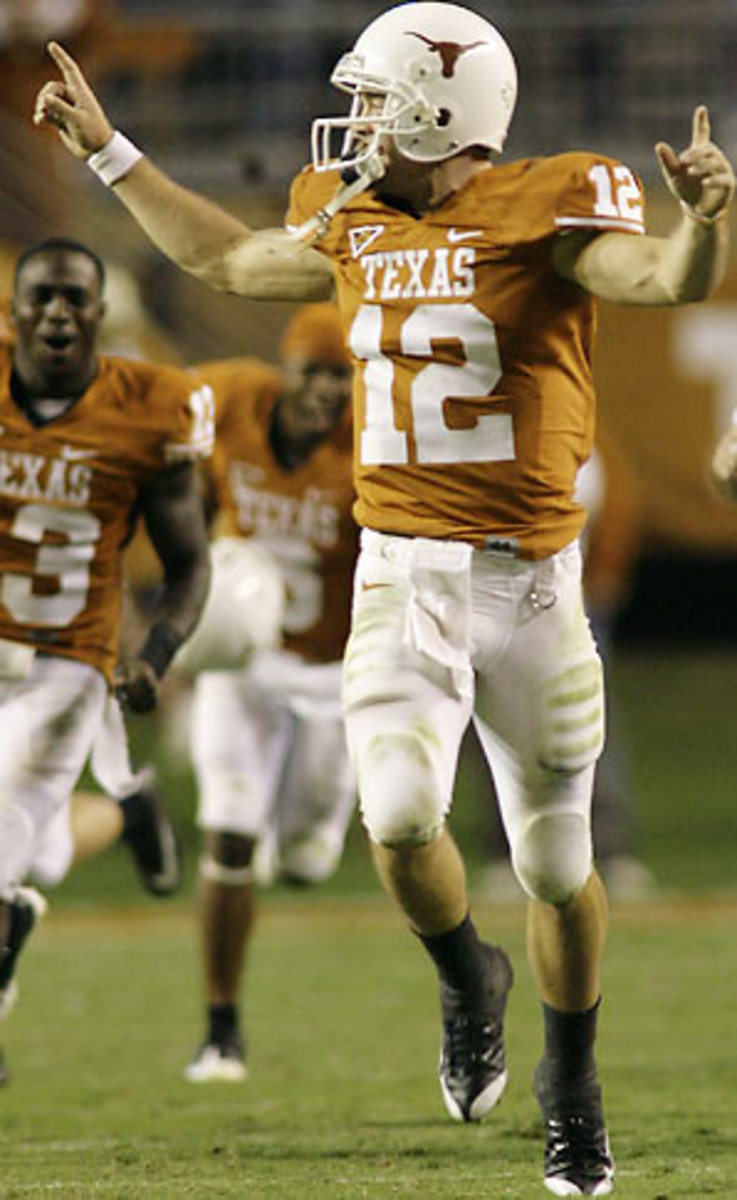Mythbusters: The top spot curse
November approaches, and the country's strictly divided along partisan lines. The future's at stake, yet we're caught up in petty arguments about bias, haves and have nots, regional superiority, money, power and influence.
I'm talking, of course, about the BCS.
The season's first BCS standings came out this week, and boy are they scandalous. For starters, Texas, Alabama, Penn State, Oklahoma and Florida round out the AP top five, while, gasp, Texas, Alabama, Penn State, Oklahoma and USC occupy the top five BCS spots. Time to light some couches on fire!
Different top fives aside, the release of those first standings inspired us to bust yet another myth that emerges this time every year.
Texas is this week's inevitable victim -- er, first place team. At this point it's hard to argue any team but Texas deserves top-status. In addition to its stellar play this season, Texas head coach Mack Brown is one of the game's true gentlemen. The Longhorns have a rabid fan base, they somehow manage to make burnt orange look better than horrible and they have a Heisman-caliber quarterback with a Hollywood-caliber name.
So, it's a shame they'll likely suffer an unfortunate fate.
This has little to do with the Longhorns' relative strengths (most facets of the game) or weaknesses (seriously, burnt orange?), but rather with that fickle temptress, the BCS's top spot. That's because only twice in the BCS's 10 previous years has the initial No. 1 team gone on to win the national championship (Florida State in 1999 and USC in 2004). And, don't forget, neither of those teams played in a conference with depth or firepower comparable to this year's Big 12.
"Wait a second," you might say (though you might sprinkle in some more colorful language), "haven't the last five initial No. 1 teams all reached the BCS National Title Game?" (A game apparently so awesome it must be in all caps.) Yes, that's true ... but only one of those No. 1 teams (the aforementioned 2004 Trojans squad) actually won the national title. And even USC's 2004 had its blemishes, as that year's undefeated Auburn squad made its own national-title rings after getting left out of the mix.
The last three teams to top the initial BCS standings met ignominious fates once they got to the all caps game. In 2005, USC again topped the first BCS standings before losing to Texas in the Rose Bowl. Ohio State topped the first 2006 standings before Florida walloped it in the title game. The Buckeyes topped the first 2007 standings too, but after spending an entire year vowing not to endure another double-digit mauling by an SEC team, advanced to the title game and promptly endured another double-digit mauling by an SEC team.
But there's nothing new about snake bitten top-ranked BCS teams. Let's go back in time to 1999, when the world was a different, more innocent place. Instead of fearing an all-out, Wall Street-induced economic meltdown, we only had to fear an all-out, Y2K-induced societal meltdown. Star Wars Episode I: The Phantom Menace ruled American box offices. Some people still wore flannel. And the pox that is the BCS had yet to ravage our landscape.
Can you remember who claimed the top spot when that year's first BCS rankings emerged? UCLA. No, really. I never would have believed it either, but we do have records that go back that far and apparently it's true.
To the Bruins' credit, they managed to hang onto the top spot until the season's final week, when their 49-45 upset at Miami ended their title hopes. In the decade since, not much has changed. UCLA's mostly continued losing and the BCS's top spot still mostly spells death.
In fact, as many initial No. 6 BCS teams have won it all as initial No. 1 BCS teams. The 2002 Ohio State Buckeyes and 2006 Florida Gators both raised the Waterford after starting outside the top five. (Hey, maybe that's what the Buckeyes should do every year...)
Of course, there are some perfectly logical reasons each non-winning No. 1 team crashed and burned en route to not grabbing the magic crystal. But when 80 percent of initial "favorites" manage to lose the big one, it's probably time to start throwing around the word "curse." Not that this publication knows anything about perfectly explainable statistical anomalies masquerading as "curses" in the commons.
In fact, LSU's the one program that seems to have mastered the BCS. The Tigers know the top spot likely promises nothing but disappointment, and that's why they avoid it like the plague. (Don't think their 30-point annihilation in Gainesville was unintentional). The Tigers have managed to win two BCS championships even though they've only spent a total of two weeks at No. 1. Their success proves the only safe time to be the BCS's top team is on Jan. 9th ... the day after the title game.
That's all for this week. Remember: Just because college football fans think it's true, doesn't mean it is.
Got a myth you want us to bust? Contact Phil at mythbusters.sportsillustrated@gmail.com.






